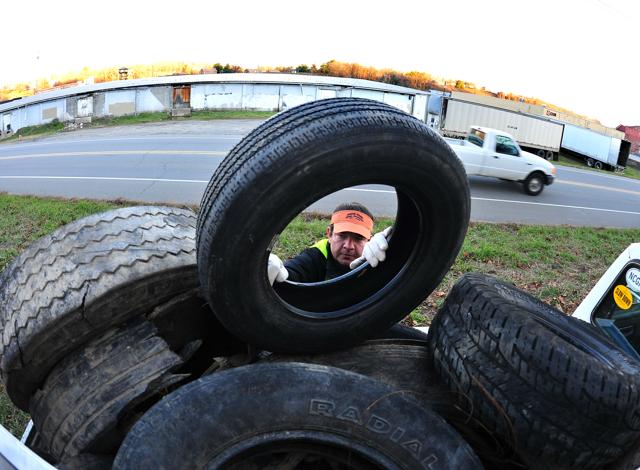They wear out; they pile up in scrap yards and landfills, turning up in the French Broad River and along its banks. And of all the things Buncombe County residents throw away, few are more persistent than old tires, which don’t readily biodegrade.
Someone’s been dumping them in Asheville's River Arts District lately, each one cut neatly across the tread with a saw or similar tool.
Asheville GreenWorks' staffer Eric Bradford got on the case last month, working with some volunteers to clean up piles of discarded tires someone had dumped along Lyman Street near the river.
Re-tired
Looking to dispose of your tires correctly? Here’s what Asheville Greenworks recommends:
Buy only new tires from a reputable dealer, and always turn in your old ones at that time.
Buncombe County residents can take 10 car tires per year (without the metal rims) to the Buncombe County landfill free of charge. There’s a $2 charge for tires with metal rims and for all tires after the first 10. The landfill (81 Panther Branch Road in Alexander) is open six days a week. For more information, call 250-5462.
Disposing of scrap tires has always been a problem, notes Asheville City Council member Jan Davis, who owns a tire store downtown. Buncombe County used to bury them at the landfill, says Davis, but they take up a lot of space and create air pockets that eventually push them back to the surface. Because of these concerns, state laws developed in the 1980s established strict guidelines for tire disposal (see box, “Re-tired”).
Dumped tires pose a number of problems, Bradford explains. They become breeding grounds for mosquitoes and other pests, and they can also leach heavy metals into the environment. In addition, big piles of tires tend to attract more trash, and if someone ignites them, the fire can rage for weeks, releasing harmful fumes into the atmosphere.
The current solution is to grind them up and incorporate the resulting material in products such as playground paving. (Earlier attempts to create artificial reefs didn't work out: Hurricanes busted up the constructions, littering North Carolina beaches with tires.)
As for the recently discovered tires that were cut off the rims, says Davis, "It's probably someone salvaging cars or something, because that would not be typical of a regular operation that would have a tire changer.
"Most of the gazillion tires out there are handled properly," he adds.
A little detective work
Under state law, every new tire sold has a 2 percent sales tax levied on it to cover the disposal cost. Dealers deliver the money to the state, which distributes it to counties on a per capita basis.
"Laws that North Carolina put in place have become a model across the nation," notes Davis. "Buncombe County provides trailers to receive scrap tires, and records are kept, to match against amounts paid by dealers [to the state]. Some businesses charge $2 to $5 to handle the scrap tires and transport them to the storage trailers. Eventually, they go to a processing plant for shredding."
Tracking down whoever’s been dumping cut tires shouldn’t be too hard, continues Davis. "All you have to do is find a small salvage yard that doesn't have tire equipment but is handling some tires … a backyard operation. With the price of metal right now, people are even taking cars that work and crushing them" to sell the scrap metal.
"A little bit of detective work will take you to that one," he points out. "Tire markings can reveal a source, too. There's a clue in those tires somewhere."
Kristy Smith at the Buncombe County landfill agrees. "What that says to me is someone is cutting the tires off for the rim and taking the rims to the scrap yard," she observes. "It could be anybody trying to get that rim. Sounds like a good sting operation."
Do the right thing
If your tires are replaced at a store, the dealer hauls the old ones to the landfill, where they're kept before being transported to a recycling facility such as U.S. Tire Recycling in Concord, N.C. "We get $78 per ton from the state" as reimbursement for the shipping and handling costs, Smith reports.
And Buncombe County junkyards are allowed to bring up to five tires per scrapped vehicle at no charge (the landfill requires proof in the form of a weight receipt for the scrapped metal).
But who's responsible for cleaning up the tires that just get dumped?
"Solid-waste enforcement is a county responsibility," notes Davis, adding, "In reality, it often falls to volunteers to do this cleanup." Groups such as RiverLink and Asheville GreenWorks say they recover and recycle hundreds of tires annually during periodic community cleanups.
GreenWorks is also working to make it easier for backyard operators to dispose of old tires properly, says Bradford, by arranging convenient drop-off points until the nonprofit can collect the tires.
Davis, meanwhile, emphasizes the contribution made by established tire dealers. "For years, we've done the right thing," he points out. "A lot of states have looked to the model North Carolina has provided."
— Send your local environmental news and tips to sandrew@mountainx.com, or call 251-1333, ext. 153.


